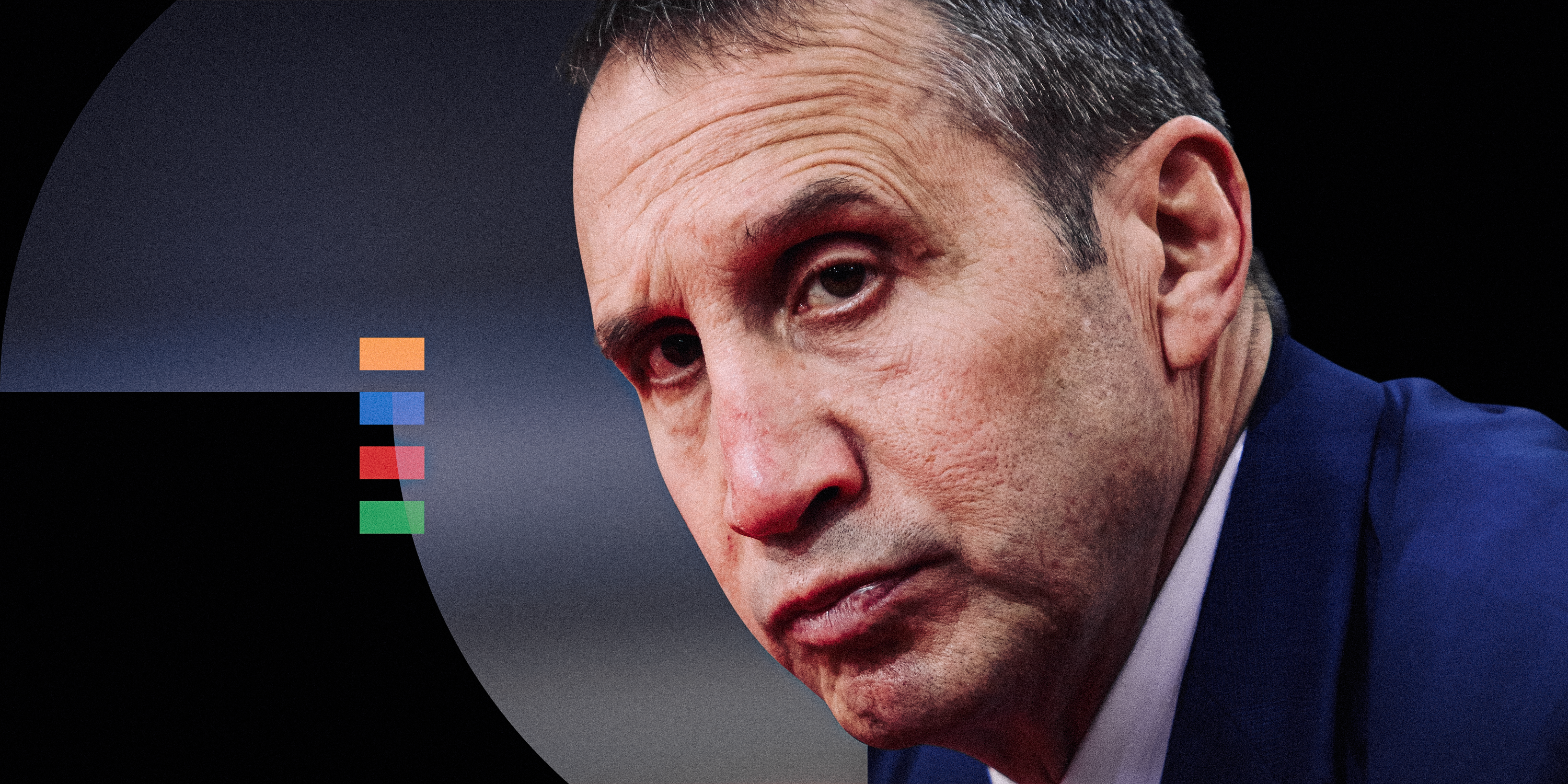LILLE, France — David Blatt chose to stand.
The international coaching legend — who has relied on a wheelchair and crutches since a multiple sclerosis diagnosis six years ago took away his ability to walk — saw me approaching his hotel cafe from a distance and started to make his move. His right hand went first, pushing up from the table where he was sitting and lifting his frame just enough to allow the left hand to finish the job. He was up, if only for a few seconds, showing off that white Canada polo shirt that he would sport for a game against Spain that afternoon. He flashed a warm smile while extending his arm for a handshake.
The former Cleveland Cavaliers coach and current Canadian men’s basketball team consultant is in a fight the medical community says he can’t win. So there’s something quite powerful about this pleasantry when he could have just stayed seated.
“That’s the way you’ve gotta be, Sam,” Blatt, 65, said when I asked why he felt the need to stand. “That’s the way you’ve gotta be. That’s what this sport and this business has taught me. If you ain’t working, you ain’t living. And if you’re not trying to improve, then you’re going backward. That’s the only thing you can do.”

Free, daily sports updates direct to your inbox.
Free, daily sports updates direct to your inbox.
That was his way of opening a 35-minute conversation in which he reflected on this challenging chapter, though there’s another coach who summed up that mentality even more appropriately.
“The great John Wooden once said, ‘Things work out best for people who make the best of how things work out,’” Blatt said. “And that’s sort of my attitude.”
Blatt still sounds like a coach.
When I arrived at the no-frills Ascotel property a half-hour early for our visit, only to see Blatt already waiting while working on his laptop and socializing with a French waiter, he dropped a line that has been a favorite among coaches since the peach basket days.
“If you’re not early, you’re late,” he cracked. “I love it.”
But the truth is Blatt’s days on the sideline are over after the condition compelled him to step down as head coach of the Greek Olympiacos team in October 2019 and end a decorated coaching career that spanned nearly three decades.
Blatt was diagnosed with primary progressive multiple sclerosis, a form of nerve and brain disorder that worsens over time. He does what he can to slow the effects — biannual infusions of a disease-modifying drug called Ocrevus, twice-daily medications that help with flexibility and mobility and a workout regimen that includes swimming, Pilates and stretching — but he has no misconceptions about what he’s up against.
“I’m doing everything I can to slow the downward progression that this type of MS causes, but I’m not the same guy I was a year ago, physically,” Blatt said. “I want to believe I’m better mentally and stronger. I’m great mentally. But unfortunately, there is a downward spiral to this condition, and the question is, how long can you maintain and keep from becoming almost incapable of moving around the way that I have to move around, which allows me to travel freely and to come in and out of stadiums, one way or another?
“I get a lot of help, thank goodness, from a lot of good people. And I do my best to physically maintain myself. But this disease, unfortunately, from a physical standpoint, has a shelf life. And the best that you can hope for until a cure is found, is to delay it. And that’s…”
He paused.
“That’s a challenge,” he continued. “That’s — that’s in my head. It’s in my mind, and it concerns me because I know that’s the reality. So I’ll stay with it as long as I can. And if I can’t, then guess what? I’m gonna find something else to do that keeps me engaged and involved, and most importantly, fulfilled.”
But make no mistake, that day is not today.
If Blatt could dream up a non-coaching job where all his wisdom and experience could be put to good use, where all those times with the Russian national team, Maccabi Tel Aviv, and, yes, the LeBron James-led Cavs were utilized for the greater good of a group while allowing him to feel alive in the basketball world, this Canadian consultant job would be it. He is a secret weapon of sorts for this team that is a legitimate contender, one that features 10 NBA players, is led by Brooklyn Nets coach Jordi Fernández and could be on a gold-medal game collision course with James and his loaded Team USA squad.

GO DEEPER
From Barcelona to Paris to Brooklyn, Jordi Fernández has grinded for his basketball life
This wasn’t the original plan, though. Back in 2018, two years removed from his Cleveland firing and not long before Blatt would learn he had MS, he was offered the Canadian head coaching job by his longtime friend and general manager of the Canadian program, Rowan Barrett (who is also the father of Canadian player and Toronto Raptors wing RJ Barrett). Blatt’s diagnosis would eventually take that job off the table, but the two of them decided two years later that Blatt would be invaluable in a consulting role where, in essence, he does everything but roam the sideline.
Blatt takes part in all of the team’s activities, from practices to front-office meetings and gatherings with coaches and players. He sits in the stands during games, studying the action with the same eye for detail that helped him win a EuroBasket title with Russia in 2007, a EuroLeague title in 2014 with Maccabi, a bronze medal at the 2012 London Olympics with Russia and become the first European coach to make the jump to the NBA as a head coach a decade ago. But his voice is a complementary one, intended to augment Fernández’s teachings and maximize this roster that Barrett built, so he takes a different tack when it comes time to share his insights: WhatsApp.
Before, during and after games, Blatt tells Fernández what he’s seeing. Rotations that are working, and the ones that aren’t. Little things about the opponent the coaching staff might have missed from the front row. As one NBA scout who saw Blatt in action shared early in the tournament, Blatt spends most of the game feverishly typing his insights into his phone.
“He’ll give his opinion, but then he’ll give a lot of support, too, because in those situations of stress, that’s what you need the most,” Fernández said of Blatt. “With his knowledge about European basketball, he knows all these players, and I know them, too, and that gives me comfort because him and I are probably the ones who know personnel more than anybody else.”
As Blatt is quick to clarify, no one within the organization is under any obligation to heed his advice.
“I’ve been known to write (things like), ‘It’s not his day, guys. Let’s think about maybe (going a different direction),’ or ‘It doesn’t look like (a certain player) is with us during that game,’” said Blatt, who fills a similar consultant role for Maccabi Tel Aviv. “It’s typically much more specific (insights).
“But the fact that I can help Jordi in any way he needs, and his staff … and having that chance on a day-to-day basis to interact with those guys and to offer them a little bit from my experience. I say, again, humbly, it’s a great experience.”
Canadian guard Jamal Murray, a star for the Denver Nuggets, said Blatt is active and vocal on the periphery of practices too.
“You can tell that he’s always thinking the game, and he’s always talking the game, always trying to find an edge,” Murray said. “I enjoy talking hoops with him, for sure. Coach is a great basketball mind and a competitor.”
When it comes to the primary stakeholders in the Canadian program, there is a level of trust that seems to make it all work with strong relationships being key. Blatt and Barrett met nearly 30 years ago when the former was coaching overseas and the latter was a player. Fernández, the Spanish coach and former Sacramento Kings assistant whom Blatt recommended for the Canadian job last summer, got his NBA start with the Cavs during Blatt’s time there when he was with the Canton Charge of the NBA’s then-D-League.
The two of them hit it off right away back then, in part because of the mirror-image nature of their basketball journeys. The 41-year-old Fernández, who grew up in Badalona, Spain, and attended college in Barcelona, was once a young European who made his way to America to pursue his coaching dreams. Blatt was raised in Boston, played under the legendary Pete Carril at Princeton, then headed overseas to pursue his playing (12 years professional; nine in Israel) and coaching career.
“I grew up watching him coach all his teams since he was an assistant at Maccabi, then Italy and Turkey, in Russia with the Russian national team (and on),” Fernández said. “I really have a lot of respect for him. He supports me, and I think that that balance and having him around just keeps me sane.”
And entertained too.
In between all the basketball feedback Blatt sends the coaching staff’s way, there is a steady stream of humor that Fernández deems “Blatt-isms.” Quotes. Jokes. All of the above.
He shared the most recent one on his phone.
“So he says, ‘The coach asked his players, What’s the smartest animal in the jungle? A monkey, they answered,’” Fernández said. “Then he asked, What’s the strongest animal? An elephant, they said. And what’s the fastest animal? A cheetah, they answered correctly. Then the coach asked, So why is the lion the king of the jungle? They didn’t know. So the coach said, ‘Because he is a (motherf—ing) lion.’”
Fernández finds Blatt’s disposition remarkable.
“That man is the most positive person in the world,” Fernández said. “There are no bad days. He never complains, and he always comes over with a smile on his face. It’s just impressive how he does it every day, traveling all over the world with us. His good energy is unbelievable. That’s why I give him even more respect.”
But the best part of this partnership, the thing that makes the Team Canada experience such a satisfying alternative for Blatt’s basketball soul, is that he feels genuinely respected and appreciated by all his coworkers.
“It’s not that way for every consultant, but they have made it a point to make me feel like a valued voice,” he said. “And again, I give them all the credit for that, because I have no right, nor would I demand it, but obviously, they find value in it. In that way, it works out for the best. And they certainly can trust me, because I’m not looking for their job.”
He laughed.
“I only want to help them be great,” he said. “That’s kind of a nice situation.”
It’s much different, in other words, than his ill-fated NBA experience that was always bound to become part of this conversation.

David Blatt and LeBron James chat late in the fourth quarter of a playoff game against the Atlanta Hawks in 2015. (Gregory Shamus / Getty Images)
As Blatt and I talk, it’s as if he’s waiting for the questions to come about the Cleveland chapter.
For myself and so many other NBA reporters who don’t cover the international game regularly, those two mostly uncomfortable seasons were our only personal point of reference when it came to Blatt’s coaching career. He came in as a celebrated hire in June 2014, fell to the Golden State Warriors in the 2015 NBA Finals when injuries to Kyrie Irving and Kevin Love tripped up the team and was in serious trouble from that point on.
His second season was doomed from the start, with Blatt struggling to gain James’ support, a midseason slide bringing the hammer fewer than three months in, and then-Cavs assistant Tyronn Lue taking the reins from there en route to the 2016 title. It was a long time ago, yes, but it makes for a fascinating backdrop in these Summer Games because of all the familiar faces that now surround Blatt.
James is still going strong at 39, with Lue close by as a Team USA assistant and, for good measure, Warriors coach Steve Kerr heading the staff. It’s only natural to wonder if this reunion of sorts might spark some reflection.
“Not really,” he said. “I mean, I’ve moved on from that period of mine in the NBA. But I am just full of admiration for what that man (James) is doing in this environment and has done for 20 years at the highest level. I mean, it’s truly amazing. Obviously, they talk about his great achievements over the course of a couple of decades. But what he’s doing today, in my mind, supersedes all of that because of the continued commitment to excellence that he’s showing and because of the level that he displays.”

GO DEEPER
Stephen Curry, LeBron James and the ‘too small’ action that unlocks Team USA’s offense
Blatt has chosen to take a healthy, big-picture outlook. He takes it back to his childhood, mentioning how he used to listen to the late, great Johnny Most calling Celtics games on the radio and never could have imagined coaching in the league he so admired. Let alone coaching one of the best players of all time.
“Look, I’m glad I had the opportunity to coach the greatest player in the 21st century,” Blatt said. “Now whether (the Cavs experience) finished in the best way in terms of my staying with the team or not, that’s one part of it. Whether I can look back and say, ‘You know, I was part of the team that ultimately did lead to a championship in the NBA.’ That’s pretty special, you know?
“… So I have no regrets. I’m thankful for that period of my life. Looking back, does that define my career? No. But am I happy that I had the chance to coach a player, or players, on that level in my career? Yeah. Hell yeah. There’s no doubt in my mind about that.”
As the discussion turns back to the present day, Blatt shared the sort of bigger-than-basketball context that makes the whole debate about his NBA legacy seem quite silly.
While he lives outside Charleston, S.C., when he’s not traveling with a team, his four adult children — three daughters and a son — live in Israel. His 27-year-old son, Tamir, is a star point guard for Maccabi Tel Aviv. Blatt, who has dual citizenship in the United States and Israel, worries every day about the ongoing Israel-Hamas war and the uncertainty that lies ahead for his children and the country he loves.
Yet amid all these challenges, Blatt insists his spirit is as strong as ever. He is driven. He is warm. He is sharp. He is present. He is fighting, all while doing what coaches have been telling their players to do since those Naismith days: Control what you can control.
Blatt, when given the choice, will keep rising.
“Obviously it’s tough for me to walk, and it’s challenging for me to do a lot of simple things that we take for granted,” Blatt said. “But … I think the thing more than anything else is that you learn, when you’re faced with this kind of thing, is that you learn how to be as effective and fulfilled at the same time as you can, when you can.
“You can be as good as you want to be within the limitations that you’re faced with.”
(Illustration: Dan Goldfarb / The Athletic; photo: Panagiotis Moschandreou / EuroLeague Basketball / Getty Images)





